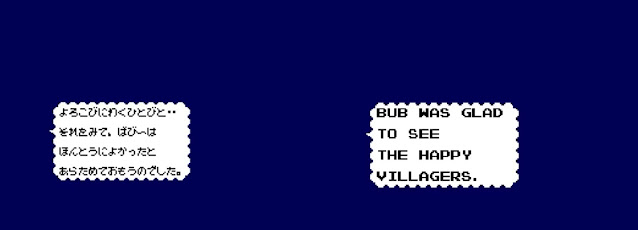Bubble Bobble is the classic arcade game adventure of the bubble dragons Bubblen and Bobblen (Baburun and Boburun in the original Japanese), trying to rescue their girlfriends from the monsters who have kidnapped them. And the very best incarnation of Bubble Bobble is the Sega Master System version - two hundred levels of bubble-blowing excitement with added story screens you won't find on any other adaptation!
The only minor problem with these story sequences is that the game was originally written in Japanese, and then translated into English (by Japanese programmers). And that meant the English translation had to use no more characters than the Japanese original, but still convey the same sense - which is tricky, since Japanese tends to use fewer characters, and considers leaving a space between words to be strictly optional. So a certain amount of simplification is going to be necessary. Here's the cutscene that plays if you complete level 100, having already collected "three magical balls".
じゃあくなる、かみのなにおいて
これよりけっこんしきをはじめ…
"In the name of our kami [Shinto deity], the wedding will commence." The rather more plain "WE WILL BEGIN THE WEDDING" isn't quite as cool, somehow.
おっだれだ、そこにいるのは!
あっばぶるんぼぶるん
In the original, Betty (or maybe it's Patty) doesn't just exclaim that the boys have come to save them, she adds "Happy!" and a heart! In the English, she doesn't even use an exclamation mark, sounding like a newsreader with a flat, emotionless "BUB & BOB CAME TO SAVE US."たすけにきてくれたのね!
うれしい♥
おのれここまでおいかけてきたのか!
In Japanese, he's surprised that the dragons have chased them all this way, but in English it's a simple exclamation of "YOU RASCAL!" - should really be rascals, plural, but then Japanese doesn't use different forms for singular and plural, much to the confusion of translators everywhere.
べていたちは、わたさない
よ~だ!
And this really isn't a translation at all. He's saying "We won't give you Betty and Patty! Nyah!", not "GET OUT OF HERE". Well, he says Betty-tachi, which I guess means the multiple people who fall under the subset of 'Betty', but I guess it makes sense to Japanese speakers...
たすけてばぶるん!
ぼぶる~ん!
"Help, Bubblen! Bobblen!" becomes "HELP US BUB!" It seems like there would have been room for the translator to fit Bob's name in there too.
くやしかったら
ここまでおいで~!
The first line is exclaiming that it's irritating, and the second is saying "Come here!", presumably meaning Betty and Patty. "GET ME YOU BOYS!" doesn't entirely convey what's going on, and sounds more than a little camp...
ぼぶるん、おいかけよう!
"Bobblen, let's go!" becomes "GET HIM, BOB!", as if Bub has had enough of the whole adventure now and is going home. His speech bubble is strangely misplaced in the English version - someone must have accidentally messed up the code while translating it.
おっけ~!いくぜ
Bob says "Okay! Let's go," in Japanese, but just "LET'S GO" in English.
And go they do, for another hundred levels. Only when the bubble dragons have defeated the Super Drunkard, father of the two villains whose wedding they interrupted, do we get some more story. It's the happy ending of the game!
ぱぱまで
"YOU BEATEN UP DAD?" is a little ungrammatical, but does sum up what he's saying. We don't get a translation of the "Ugh!" noise in the third line, though.やられちゃったの?
うっそ~!
おぼえてろよ
ぜったいに
しかえししてやるからな!
The Japanese is a more elaborate promise to get revenge, but "I WILL MAKE YOU REGRET." does somehow sound cool.
きゃ~っ!
"EEK!" sounds better than "Kyaa!" to English-speaking ears, I think.
たすけてくれて
ありがとう♥
でも、そのすがた…
It's newsreader Betty again, with an emotionless "THANKS FOR YOUR HELP". In Japanese she adds another heart symbol, and then goes on to say "But your appearance..."
だいじょうぶ。
のろいはもうとけているわ。
ほら!
And "I FEEL FINE NOW" isn't translating Patty's observation at all well. She says "It's okay" in the first line, then adds "The curse is undone. Look!" Patty seems to have the ability to see the near future in this ending sequence, because immediately after she says that, the dragons turn back into their human forms.
うれしい!またへいわに
くらせるのね♥
And now the English translation is completely losing it. Patty's supposed to be exclaiming "Happy!" once more, and saying that now they can live happily again. "FOREST ALSO CHANGED" is the second half of the translation of the next speech bubble...
みて!
もりののろいも
とけていくわ!
"Look! The curse on the forest is coming undone!" says Betty in Japanese. In English she goes for the more succinct "THE COLOR OF THE"
べてい~だいすき♥
"I love you Betty!" won't fit in the speech bubble, so Bub just shouts "BETTY!"
よかったね。ぱてい~♥
And likewise, Bob's "This is great!" before his "PATTY!" has to be cut.
はっぴい~えんど♥
"Happy end" and a heart symbol just becomes "THE END." But our heroes seem to be happy, anyway, merged into two amorphous blobs as the background disappears. But then everything disappears, and the epilogue is told to us by disembodied speech bubbles.
そののち、ばび~たちは
むらにもどり、なかまたちから
だいかんげいされました。
Our heroes ("Babi-tachi" in the original - 'Bub and the rest'?) do return to the previously unmentioned village in the Japanese version, but there's space to start the sentence with "After that," and end it with saying their friends were happy about it. All the English version has room for is "BOB & BUB RETURNED TO THE VILLAGE."
よろこびにわくひとびと…
それをみて、ばび~は
ほんとうによかったと
あらためておもうのでした。
The specific "BUB WAS GLAD TO SEE THE HAPPY VILLAGERS." does accurately reflect the Japanese version, which also only mentions Bub, and generally talks about everyone being happy again.
いつのひか、ばび~たちは
またあらたなるぼうけんに
たびだつのかもしれません。
The content of this speech bubble gets spread over the next two in the English translation. In the Japanese, we're told that some day, Babi-tachi will start a new adventure. In English, it's "SOME DAY, BOB & BUB WILL START"
だってふたりは、おとこのこなんですから!
"A NEW ADVENTURE.", carried over from the previous speech bubble, obliterates the final cheery thought "Because the two of them are boys!" Roll the credits!























No comments:
Post a Comment